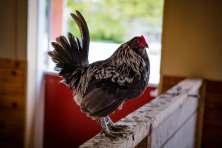
3 minute read
News
South Korea reports avian influenza cases in wild birds, but poultry appears unaffected
South Korea has confirmed three additional cases of bird flu in wild birds, but cases in domestic poultry populations appear to have fallen. Reporting in the Korea Herald explains that the lack of recent cases in poultry could indicate a break in bird flu transmission among local farms. South Korea’s agriculture ministry said that the number of “wild” bird flu cases remained nearly flat in the last week as birds begin migrating north as the weather warms. Since October 2020, the country has recorded 232 cases of H5N8 bird flu. 108 cases were recorded in poultry farms. Animal health experts warn that the central region of the country could experience more cases as the birds migrate
Advertisement
ChickenBoy analysis robot: keeping track of flock health in the broiler house
Why is the current flock performing so much better than the previous one? Why is the litter in the rear right corner always the first to get wet? Even with years of experience, it is not easy for broiler producers to answer these and similar questions. The reason is quite simple: it is difficult to collect the necessary data 24 hours a day, 7 days a week, and basically in 3 dimensions – and it is even more difficult to analyse them. Big Dutchman now offers a solution to this problem: ChickenBoy is an analysis robot for permanent bird monitoring and measuring of climate parameters in broiler houses. Equipped with different sensors and several cameras, ChickenBoy is suspended from a rail system under the ceiling and keeps track of what is going oninthebarn.Apowerfulprocessingunit analyses the data, partially with complex AI algorithms, and prepares a graphical represen-tation for the customer. “We want to provide the farmer with an adequate digital cockpit that shows information about the broiler house in a clear and easy-to-understand manner, ” says Dr. Heiner Lehr, CEO of Faromatics, therobot’smanufacturer. The added value for the customer is obvious. The cockpit comprises multiple two-dimensional maps of the barn that visualise, for example, the current air quality very exactly, based on values such as temperature, air speed, humidity and the concentration of harmful gases (CO2 and Nh3). The measured data can also be viewed in diagrams that indicate the progress of the batch.
Northern Ireland’ s bird flu measures to lift on 13 April
Mandatory housing measures to stem the spread of bird flu are being lifted at midnight on 13 April, but poultry keepers across Northern Ireland are told to remain vigilant. Previous statements from the Ulster Farmers Union say that the region’s poultry industry is moving in the right direction as producers prepare to turn their flocks out onto controlled outdoor areas. Poultry keepers are being urged to use appropriate biosecurity measures as the bird flu restrictions ease. Ulster Farmers Union poultry chair Ronnie Wells said, “…whilst some may think this symbolizes the end of the risk period, this is not the case. It is important that bird keepers remain vigilant as migratory birds are still present, therefore the risk of avian influenza (AI) remains.” Wells went on to say that backyard poultry keepers should be on high alert for signs of bird flu and to take extra care with cleaning and disinfecting equipment, clothes and vehicles. New outbreaks of bird flu have been reported in other areas of the UK in the last week.
F r e e - r a n g e e g g producers in Estonia are confident that sales will not be impeded by bird flu restrictions
Estonia implemented movement restrictions and biosecurity measures to curb bird flu outbreaks, including housing measures that keep hens indoors that may make free-range certification difficult. A story from Estonia’s ERR News explains that though the housing requirements could prevent freerange egg producers from meeting production standards, this outcome isn’t likely. Estonia’s biosecurity measures came into effect in March, but will likely lift by 24 June. This is under the 16-week regulatory threshold that determines if eggs can be sold as barn-raised or free-range. Free-range poultry keeper Heli Lääts said that the outdoor ban coincided with colder weather that was unsuitable for the birds. “There is not much reason to let chickens outside right now as it is since it is so muddy. It is not like the chicken will do anything smart there any way. They can get some sun, that is good and well and chickens like that. That is what we have also done, we let our chickens out when they have something to pick on






